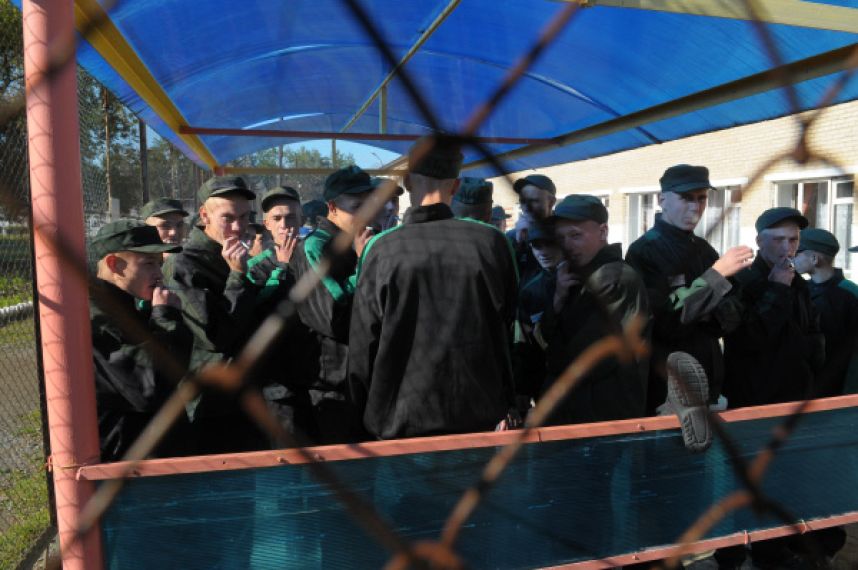Russia’s Federal Penitentiary Service has warned that “extremist Islam” is growing among inmates of the country’s penal colonies.
ITAR-TASS reported earlier this week that Valery Trofimov, the head of social, psychological, and educational work at the Federal Penitentiary Service, said that the penal colonies were “the most favorable source of recruitment for new jihadi fighters, because the criminal subculture also implies contempt not only toward law enforcement officials, but also toward the state as a whole.”
According to ITAR-TASS, in June 2010, parcels containing books and leaflets considered extremist by Moscow were sent from Egypt to penal colonies and detention centers in Chuvashia.
The FSB has said that six former convicts who served sentences in Russia’s penal colonies, later participated in terrorist acts in the North Caucasus.
The Federal Penitentiary Service gave surprisingly exact information: ITAR-TASS quoted Trofimov as saying that there are currently 426 convicts who profess “extremist ideology”, which constitutes a 40% rise over last year. The FPS said that since 2012, the number of prisoners convicted of “terrorist and extremist” crimes has risen from 1,056 to 1,119.
The rise comes amid an increased tendency in convictions for offenses related to incitement of political, ethnic and religious hatred, according to Trofimov.
“If in 2009 the correctional institutions housed 176 members of right-wing groups, there are currently 342 people, including 10 minors, being held,” he added.
Trofimov made his comments at a national conference in Moscow earlier this month, titled “On measures to combat the spread of radicalism and religious extremism in prisons.” The event was attended by representatives of the Presidential Administration, the State Duma, the Supreme Court, the National Anti-Terrorism Committee, the State Anti-Drug Committee, the General Prosecutor of the Russian Federation and other agencies.
The FPS representative said that Russia plans to learn from Arab states to rehabilitate supporters of radical Islamic movements, including Saudi Arabia, Yemen, and Egypt, where he said that the prison authorities had developed long-term programs involving religious leaders, psychologists, and social workers. Trofimov said that the FPS is “ready to conduct individual psychological work with the prisoners, use intervention programs in dealing with convicted terrorist and extremist crimes. A leading role should be played by what Trofimov described as “clergy from traditional Russian faiths”.
Among the proposals for improving efforts to curb the spread of radical ideas in correctional institutions, the forum participants noted the need for closer inter-agency cooperation, public support, stricter accountability for crimes related to terrorism and religious extremism ,personnel training and active counter-propaganda work.
Russian-language, pro-jihad, anti-Moscow Chechnya-based website Kavkaz Center commented on the reports, accusing the Russian prison service of Islamophobia and discrimination against Muslims, and saying that the prison authorities had refused to allow Muslim prayer areas to be constructed in penal colonies.
Kavkaz Center writes:
Meanwhile, the ” politically correct” analysis of the causes of the spread of Islam in Russian prisons and concentration camps, and the equating of the criminal world with Islam does not at all explain the choice of priorities of religious prisoners.
In addition, the infidels do not explain the criteria they are using to declare those Muslims who are in their torture-chambers as “radicals”. Thus, the reason for persecution may be carrying out collective prayer, keeping a Quran or a prayer rug. “Extremism” may be declared as learning the Arabic alphabet or distributing Islamic literature . Well, if one or other of the lags accepts Islam, then it becomes a real emergency.
The infidels are trying to prevent the spread of Islam by punitive measures like banning prayer and destroying prison mosques, like what happened in the Vyazniki Vladimir region. The bosses of that prison colony, who gave permission to build (a mosque), then changed his mind . The almost-finished building, erected at the expense of prisoners’ relatives, was destroyed, and never opened.

